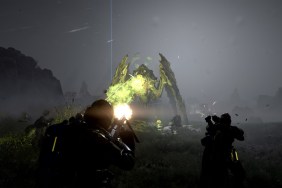Not playing this game would be the real original sin (I'm sorry).
When I think back on my first few days with Divinity: Original Sin, the first word that comes to mind is "daunting." I don't mean it in a negative sense, but rather as a description of its initial impression. It provides players with hours upon hours of content in the first area alone. It features a staggering number of NPCs with unique dialogue. It kicks the player's ass and takes pleasure in doing so.
These concepts aren't necessarily new to RPG fans who grew up on PC classics such as Baldur's Gate or Neverwinter Nights, but the formula's triumphant return in 2014 stands out as both bold and impressive. Divinity: Original Sin, available on Steam, also touts combat that feels contemporary and forward-thinking in its design. It all culminates in an experience that simultaneously captures nostalgia and remains grounded in the modernity of video games.
Original Sin sustains that middle ground in its narrative and mechanics. The former reminds me less of old fantasy RPGs in that the game focuses on humor and clever writing more so than a compelling backstory or overarching plot. The basic premise involves source hunters who embark on a quest to rid the world of evil sorcerers, but much of it felt like white noise in my playthrough. I did want to learn about the mysterious End of Time hub world that appears in the opening hours, but other than that, the story itself did little to interest me. Luckily, Original Sin has charm, and it shows in the writing. Players will discover all kinds of quirky personalities in the world, and I couldn't help but fall in love with the game's emphasis on weird and/or humorous moments.
The unscripted moments also stand out, namely the game's introduction of role-playing in its story. The player starts out with two main characters, both of whom respond to important events and engage in conversation with each other. One of those characters can be set to AI behavior, but I opted to control both—Scarlett is the pessimist of the group, often questioning the motives of others; Roderick, on the other hand, is far more trusting and doesn't jump to conclusions. Initially I thought it was silly to control both of them, but I soon found myself absorbed in my own little narrative creation.
The inclusion of co-operative multiplayer adds another layer to the role-playing dialogue. Now two players can control two separate characters and craft their own personalities. It's up to each pairing to decide whether their relationship will be harmonious or tumultuous. Though I prefer Original Sin as a single-player experience, I did enjoy the back-and-forth dialogue with a friend. Also, it felt quite good to share the joy of victory with a partner considering the game's difficulty.
The combat in Original Sin is turn-based, and for good reason. It's a game that rewards careful planning and patience. A fast-paced and aggressive approach is almost always guaranteed to fail. In fact, failure will be a common theme regardless of preparation. Encounters often involve a lot of enemies, and all of them hit hard. This approach preys on the player's nerves and makes every single battle tense. The key to victory is to use action points wisely—they can be saved for later turns or used immediately and the push/pull factor of that decision discourages repetition. After 20-30 hours with the game, I was still having a blast with the combat.
Elements also play a huge role in the battle system. Some enemies have obvious weaknesses, but it goes much deeper than that. See an enemy in a puddle of water? Zap them with lightning immediately. Want to do a ton of damage to one particular enemy? Use a poison ability, shoot a fire arrow at the poison, and enjoy the ensuing explosion. There are numerous elemental combinations to consider, and enemies can utilize them as well. It introduces even more depth to the combat, and depth in general is a recurring theme in Original Sin.
Depth of content is perhaps the most impressive thing about Original Sin, especially when one considers developer Larian Studios' budget. The number of quests to complete, items to collect, and NPCs to talk to rivals most big-budget titles. It showcases a level of care and attention to detail that not only provides numerous hours of content and replay value, but also helps flesh out the world of Rivellon. The land is active and alive, as if the player is just one small cog in a much larger machine.
Sometimes the game gets in its own way because of this, specifically with its lack of direction when it comes to quests and clunky inventory system. A large portion of my time with the game was spent wandering aimlessly to find a quest or transferring items back and forth between party members because only one person can repair or identify items. It's an admittedly minor blemish that still provides moments of frustration.
Getting past the frustration is easier when I focus on the level of freedom Original Sin provides. I may have been lost at times, but that's because the game allows me to go anywhere. I can spec my character in any direction and teach them various abilities with skillbooks. I can barter with every single character in the game. I can steal paintings from all the townspeople (trust me, you want to steal paintings). A lot of games promise this level of freedom but fail to execute well—Original Sin executes briliantly.
Trying to describe Divinity: Original Sin in words only gets one so far. I've spent plenty of time with the game and still feel like I've only scratched the surface. In fact, I didn't even mention the art style and soundtrack, both of which are fantastic. It comes down to this: Fans of old-school PC RPGs that don't hold the player's hand and focus on depth and freedom will adore this game. Audiences without that experience will also find something to love in Divinity: Original Sin, because depth and player freedom never become dated.
Code provided by publisher. Review based on PC version. Also available on Mac.
-
Challenging and tense turn-based combat
-
May feel too challenging for some players
-
Ridiculous amount of content
-
Encourages player choice/freedom
-
One of the year's best soundtracks
-
Detailed world
-
Clunky inventory system
-
Quests don't give much direction
-
Co-operative multiplayer
Divinity: Original Sin
-
Divinity: Original Sin #1
 [Click for full-size image]
[Click for full-size image] -
Divinity: Original Sin #2
 [Click for full-size image]
[Click for full-size image] -
Divinity: Original Sin #3
 [Click for full-size image]
[Click for full-size image] -
Divinity: Original Sin #4
 [Click for full-size image]
[Click for full-size image]











